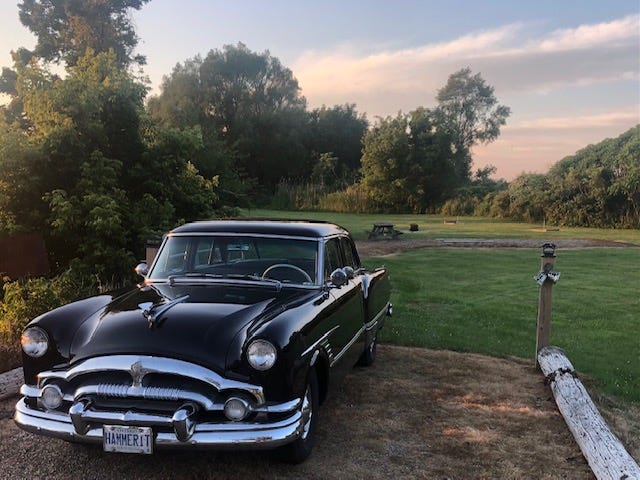Friday 6 September, 2024
The Bridge
Crossing the Severn last Sunday.
Quote of the Day
I stand against confiscatory taxes, totalitarian collectives and the ideology of the inevitability of the death of every individual. I no longer believe that freedom and democracy are compatible.”
Peter Thiel, writing in an online libertarian journal in 2009
Footnote Palantir, the company founded by Thiel (with investment from the CIA) now has the contract to build a data platform for the UK’s NHS.
Musical alternative to the morning’s radio news
Edward Elgar | Salut d’amour Op. 12 | Berliner Philharmoniker
Pure schmaltz, but what the hell.
Long Read of the Day
Silicon Valley is an aristocratic culture
Background: On Sunday last, my Observer column was about the reading habits of the Silicon Valley crowd. It was prompted by reading a reading list created by Patrick Collison, and a Substack post by Tanner Greer commenting on the list and arguing that the literary ‘culture’ of Washington D.C. differs critically from the reading habits of Silicon Valley.
Henry Farrell (Whom God Preserve) has taken issue with this in his usual erudite way.
The actual difference, as I see it, is not one between the philistines of the Beltway and the bibliophiles of the Valley. It is between a technocratic culture in which the public display of a sound general education is irrelevant and an aristocratic one where it can be a valuable asset. Doing well in DC policy circles depends on technocratic knowledge, bureaucratic ruthlessness and connections that are mostly acquired through work or shared education. To do well in Silicon Valley, you want these things, but you also may prosper better if also you appear to have cultivated the appropriate personal dispositions. Being able to talk in the right ways about certain books may persuade others that you might have those dispositions. Hence, it makes it more likely that your start-up will be picked for Y Combinator, get early funding from the right places and so on.
Most of the elements of this explanation are already there in Tanner’s post, but they are partly obscured by his embrace of Silicon Valley’s self-generated mythology of disruption and rebellion. To the extent that Silicon Valley, unlike DC, has a ‘canon’ of books, it is not because Silicon Valley people care more about books than their Beltway equivalents. It is because book-learning does a different kind of cultural work in the Valley than inside the Beltway…
Like everything Farrell writes, it’s interesting. And his conclusion is rather different from Tanner’s. “Silicon Valley has changed remarkably in the intervening two decades,” he writes.
Its culture now centers not simply on technology but the exercise of power. Powerful founders and funders not only aspire to make lots of money, but to reshape the world along better lines. They see themselves as a political elite as well as a financial one, and they are looking to educate themselves, often in ways that reinforce their own values and understanding of their own benevolent role. They want to be formed, and accidentally or consciously form others too.
Worth your time if you are interested in this stuff.
Books, etc.
Screenshot
Unlike more sensible people I am more wired than is good for me. But I’ve also always carried a paper notebook — and still do. So I was interested to see this book — and then find “Moleskine Mania: How a Notebook Conquered the Digital Era”, an interesting excerpt from it, by its author.
Might even have to read it. For now, though, I’ve just scribbled a note in my notebook.
Linkblog
Something I noticed, while drinking from the Internet firehose.
The Geek’s Prayer
Lord, grant me the acumen to automate the tasks that do not require my personal attention,
the strength to avoid automating the tasks that do,
and the wisdom to know the difference.
From Phil Giammetti’s Mastodon, via Quentin.
Feedback
On Monday I mentioned an historian’s view that the prevalence of evangelical rhetoric in American public life have something to do with the skills on display at the Democratic Congress? Rex Davies is sceptical. “Having taught presentation skills internationally, I deduced that the American educational tradition of ‘show & tell’ is the cause. Children are required to address their classmates on a regular basis in the U.S. education system. Experience of public speaking in these formative years accounts for their oratorial expertise in later life. Subsequent bible-bashing may burnish these skills but simple practice – from an early age – makes perfect.
And on the Tesla cartoon… David Ballard added a cautionary note: “Also be careful of the autocratic transmission!”
The photograph of the beautifully maintained Alvis car in last Friday’s edition prompted Mark Sherman, a wizard restorer of older American vintage cars to send a photo of one of his beautifully-restored black Packards “which occasionally causes someone to comment that they look ‘gangsterish’. I point out that back in the day – gangsters drove Cadillacs, Police drove Lincolns, and the Judge that sentenced you drove a Packard…”.






